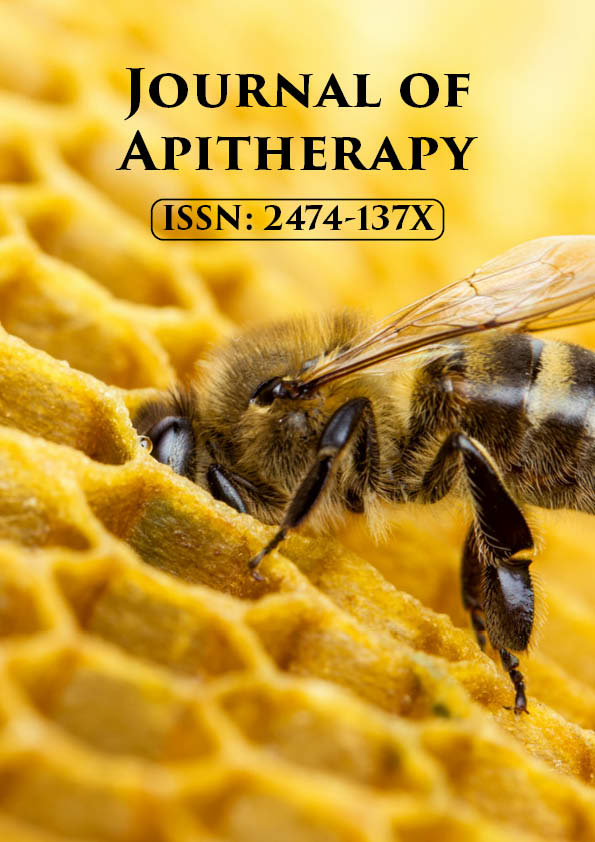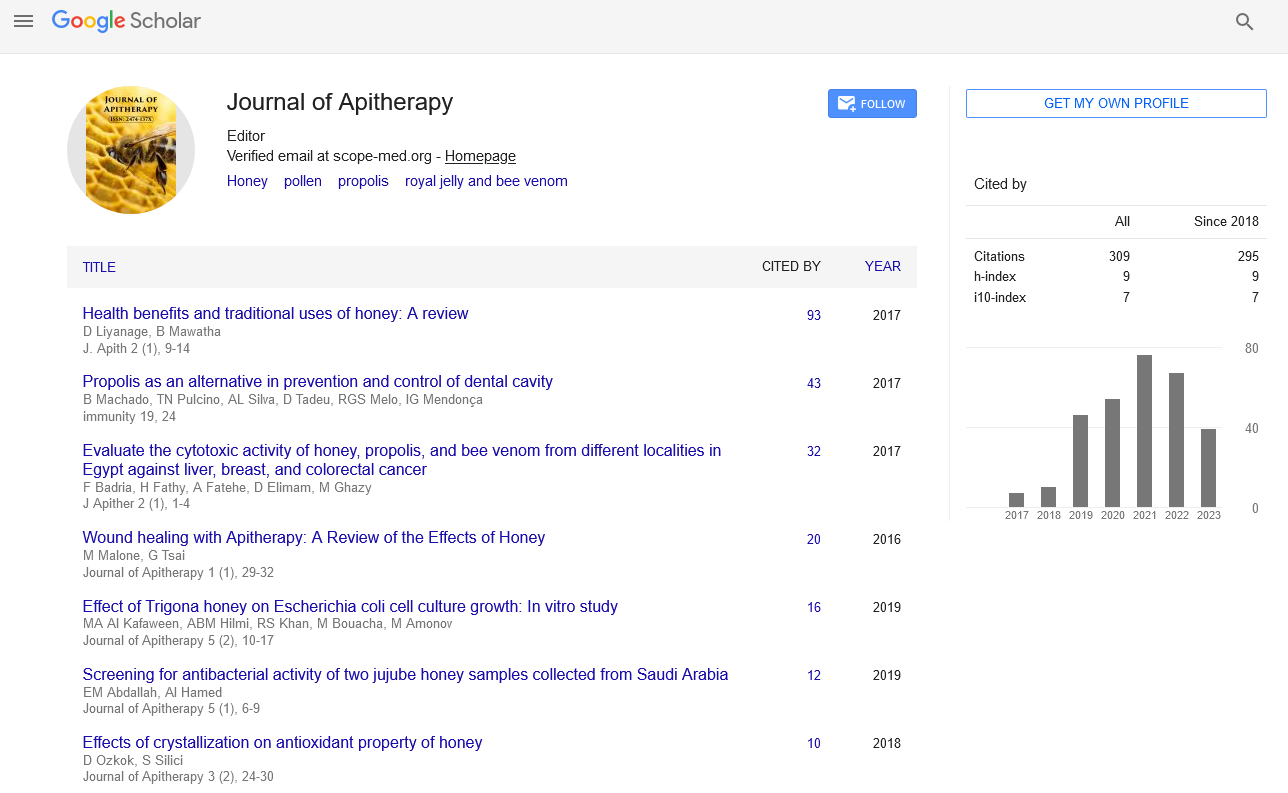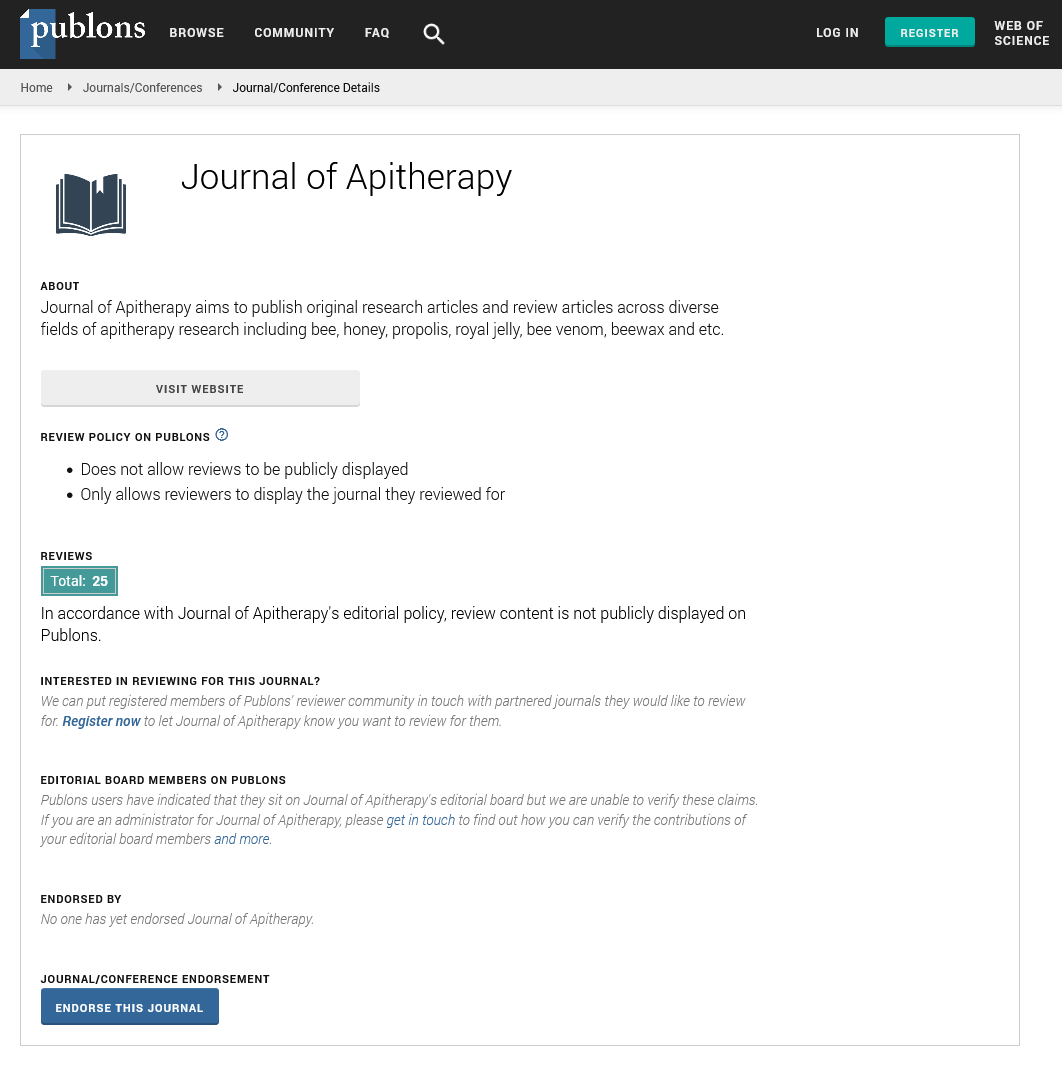Perspective Article - Journal of Apitherapy (2023)
The Healing Power of Bee Pollen: Exploring its Potential Benefits and Safety
Fang Yue*Fang Yue, Department of Agriculture, University of Helsinki, Helsinki, Finland, Email: fang@gmail.com
Received: 03-Aug-2023, Manuscript No. JAPITHERAPY-23-112698; Editor assigned: 07-Aug-2023, Pre QC No. JAPITHERAPY-23-112698 (PQ); Reviewed: 21-Aug-2023, QC No. JAPITHERAPY-23-112698; Revised: 28-Aug-2023, Manuscript No. JAPITHERAPY-23-112698 (R); Published: 04-Sep-2023
Description
Bee pollen therapy is a natural remedy that has been gaining popularity in recent years due to its potential health benefits and holistic approach to wellness. This therapy involves the consumption of bee pollen, a nutrient-rich substance collected by bees from the stamens of flowers. Bee pollen is renowned for its impressive nutritional profile, containing a wide range of vitamins, minerals, antioxidants, and other bioactive compounds that can have a positive impact on human health. In this comprehensive exploration of bee pollen therapy, we will delve into its history, composition, potential health benefits, and safety considerations.
The origins of bee pollen therapy
Bee pollen therapy, also known as apitherapy, has been practiced for centuries in various cultures around the world. Ancient Chinese, Egyptian, and Greek civilizations documented the use of bee products, including bee pollen, for their medicinal properties. The ancient Greeks even referred to bee pollen as “ambrosia,” believing it to be food of the gods that granted longevity and vitality.Modern interest in bee pollen therapy can be traced back to the early 20th century when Austrian scientist Karl von Frisch conducted innovative research on bees’ behaviors and their collection of pollen. His work laid the foundation for understanding the nutritional and medicinal value of bee pollen.
Composition of bee pollen
Bee pollen is a complex mixture of substances that bees collect from flowers. Its composition varies depending on the types of plants and flowers visited by the bees, geographical location, and the season. However, bee pollen generally contains the following key components:
Amino acids: Bee pollen is a rich source of essential and non-essential amino acids, the building blocks of proteins. These include tryptophan, lysine, and methionine.
Vitamins: It contains a wide range of vitamins, such as vitamin A, vitamin C, vitamin E, vitamin D, and several B vitamins, including B1 (thiamine), B2 (riboflavin), and B3 (niacin).
Minerals: Bee pollen is abundant in essential minerals like calcium, magnesium, potassium, and iron, which are vital for various bodily functions.
Antioxidants: It is packed with antioxidants like flavonoids, carotenoids, and quercetin, which help combat oxidative stress and reduce inflammation.
Enzymes: Bee pollen contains digestive enzymes like amylase and protease, which may aid in nutrient absorption.
Fatty acids: It includes omega-3 and omega-6 fatty acids, which are beneficial for heart health and overall well-being.
Polyphenols: These compounds have antioxidant properties and are associated with numerous health benefits.
Potential health benefits of bee pollen therapy
Bee pollen therapy is often touted for its potential health benefits, although more research is needed to confirm some of these claims. Here are some of the potential advantages of incorporating bee pollen into your wellness routine:
Nutrient-rich superfood: Bee pollen is a concentrated source of nutrients, making it an excellent addition to the diet, especially if people have dietary deficiencies.
Boosts immunity: The antioxidants in bee pollen can strengthen the immune system and help the bodydefend against infections and diseases.
Allergy relief: Some people believe that consuming local bee pollen may help alleviate seasonal allergies, as it can expose the body to small amounts of allergens, potentially reducing the severity of allergic reactions.
Anti-inflammatory properties: The anti-inflammatory compounds in bee pollen may aid in reducing inflammation in the body, which is a common underlying factor in various chronic diseases.
Energy and vitality: Bee pollen is often associated with increased energy levels, improved stamina, and enhanced overall vitality.
Digestive health: The digestive enzymes in bee pollen may support better digestion and nutrient absorption, potentially alleviating digestive issues.
Skin health: Some individuals report improved skin health and a more youthful complexion after incorporating bee pollen into their daily routine.
Weight management: Bee pollen may help with weight management by providing essential nutrients while reducing cravings for unhealthy snacks.
Hormonal balance: It is believed that bee pollen can assist in balancing hormones, particularly in women experiencing menopausal symptoms.
Anti-aging: The antioxidants and nutrients in bee pollen may contribute to a youthful appearance and overall longevity.
Safety considerations
While bee pollen therapy has poential, it’s essential to consider some safety precautions:
Allergies: Bee pollen can trigger allergies in some individuals, especially those allergic to bee stings or other pollen types. Start with a small amount to assess tolerance.
Quality control: Ensure that you source bee pollen from reputable suppliers to minimize the risk of contamination with pesticides or other harmful substances.
Dosage: Start with a small dose and gradually increase it as needed. Consult a healthcare professional for personalized guidance.
Pregnancy and nursing: Pregnant or nursing women should consult with a healthcare provider before using bee pollen.
Medication interactions: Bee pollen may interact with certain medications, so consult doctor if someone are taking any prescription drugs.
Bee pollen therapy is an ancient practice with a growing body of modern research supporting its potential health benefits. As a nutrient-dense superfood, bee pollen offers a wide array of vitamins, minerals, antioxidants, and bioactive compounds that can positively impact various aspects of health. However, individual responses to bee pollen can vary, and it’s essential to exercise caution, particularly if people have allergies or are taking medications. Consulting with a healthcare professional is advisable before incorporating bee pollen therapy into wellness routine. With responsible use and proper precautions, bee pollen may become a valuable addition to holistic approach to health and well-being.







